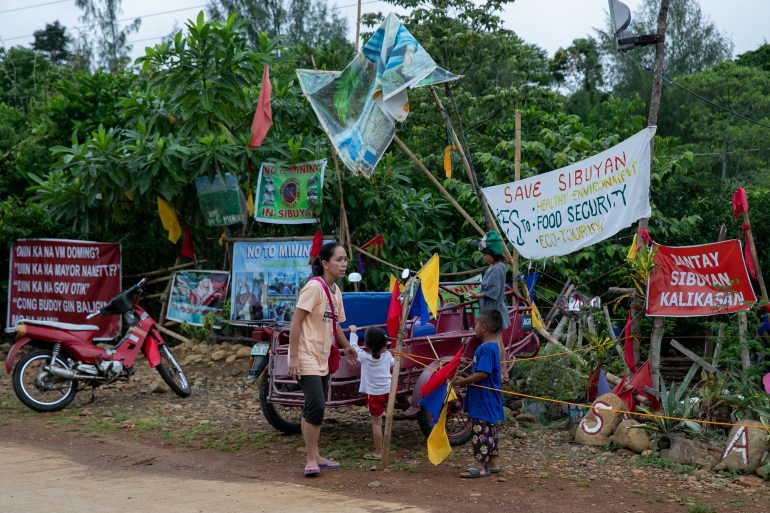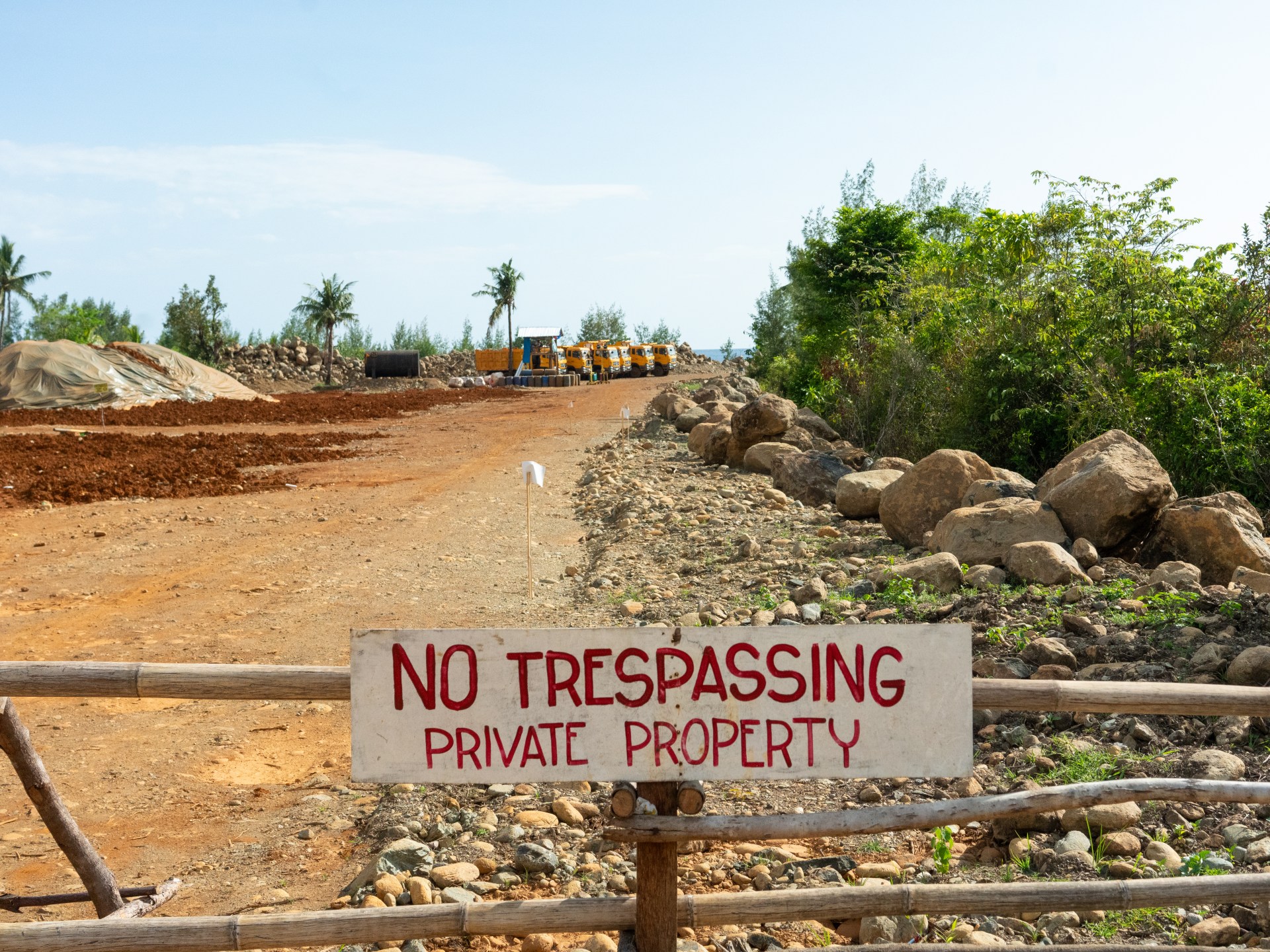Manila, Philippines – Jhed Tamano and Jonila Castro were volunteering to help fishing communities affected by development around Manila Bay when, just after nightfall on September 2, they were allegedly grabbed from the street by four armed, masked men and forced into a grey SUV.
Now, more than one week later, authorities have provided no answers about the whereabouts of Tamano, 22, and Castro, 21, leaving colleagues and family members frustrated and suspicious.
“I’m very angry,” Rosalie Castro, Jonila’s mother, told Al Jazeera. “I just want my daughter back.”
In a report released on Saturday, progressive groups blamed state actors for the abductions. Alleged military officers had been monitoring Castro for months before her disappearance, her mother said.
The Philippine National Police has publicly suggested that unnamed outside groups are responsible for the disappearances. Privately, they have accused the pair of being affiliated with the New People’s Army (NPA), a communist armed group.
The abductions underscore the dangers facing the Philippines’s environmental and land defenders since President Ferdinand Marcos Jr took office in June 2022.
At least 15 community organisers and activists have been abducted since his presidency began, Raoul Manuel, a representative of the leftist Kabataan Partylist, said last week.
Marcos has backed large mining and renewable energy projects as a way to unlock the country’s economic potential, but opponents of these projects, including land activists and Indigenous leaders in remote mineral-rich areas, face grave dangers, according to a report released on Wednesday by Global Witness, an environmental advocacy NGO based in the United Kingdom.

In the Philippines, 11 environmental defenders were killed in 2022, making it the deadliest country for environmental activists in Asia, the report said. Many more have faced threats, including activists protesting against an illegal nickel mine in the central island of Sibuyan, according to the report.
The disappearances of Tamano and Castro “speak to the dangers” faced by environmental advocates, said Rachel Cox, campaign lead for Global Witness.
“This is the reality for defenders in the Philippines,” Cox said. “If you challenge the status quo, you can be undermined and attacked, seemingly with impunity.”
Land reclamation
Tamano and Castro had been volunteering with AKAP Ka Manila Bay, an advocacy group partnered with church organisations to oppose land reclamation projects on the shores of the bay, including the $15bn New Manila International Airport in Bulacan, near Castro’s hometown.
The projects, which began under former President Rodrigo Duterte, have raised concern at the United States embassy due to the involvement of a blacklisted Chinese construction firm. They have also been criticised for destroying fishing waters and threatening the ecosystem, including mangrove forests crucial in preventing flooding in low-lying Metro Manila, home to 26.7 million people.
Marcos said last month he would suspend the reclamation projects pending further review. But he has not issued a formal executive order, giving his announcement no legal force, and environmental groups have since reported seeing ships dredging the bay.
When they disappeared, Tamano and Castro were working with residents of fishing villages in Orion, a coastal town across from Bulacan, who said their livelihoods were being harmed by dredging projects for the airport.
Thaad Samson, the acting spokesperson of AKAP Ka Manila Bay, said the group hoped to “establish a connection” between the airport development and other reclamation projects throughout Manila Bay.
Since its formation in 2018, AKAP Ka Manila Bay has been pressured by the military and “red-tagged”, or labelled without evidence, as a front organisation of the NPA, which has fought an armed rebellion against the government for more than 50 years. Known as red-tagging, it is a tactic used to silence activists, especially environmental and land defenders.
“It has a chilling effect,” Samson said.

None of this deterred Tamano, a graduate of Bulacan State University, and Castro, who paused her own studies to become a full-time volunteer.
“They were excellent students,” Samson said, who believed “it is worth doing this and giving up some of [their] ambitions and dreams”.
‘We were in danger’
Rosalie Castro said Jonila was worried about returning home after, in 2022, a man identifying himself as a military officer visited her three times, asking her to convince Jonila to surrender to authorities as a member of the NPA.
“I said no, she’s not a rebel. She didn’t commit any crime,” Rosalie said. “She’s quite thin. She has no capacity to do all these things.”
This year, another man visited three times making the same request, identifying himself as a sergeant in the Armed Forces of the Philippines. In June, he was accompanied by a man who said he was an officer with the government’s controversial anti-communist task force.
Rosalie recalled that Jonila warned her not to let the officers in, but she trusted them. “I was uncertain of the extent of the risk,” she said.
When Rosalie heard that Jonila had been abducted, she sent a text message to the sergeant, who initially said he would help. After one message, however, he went silent. The officer did not respond to calls and text messages sent by Al Jazeera.
On September 5, three days after the two went missing, Rosalie and a group of civil society and church representatives went to the Orion police station to file a report on the disappearances. But the police officers instead presented a slideshow showing that Jonila was connected to the NPA, according to several people at the meeting.
The police then refused to file a report, which is standard procedure, and began accusing the group of being communist supporters.
“We felt like we were being interrogated,” Rosalie said.
Police also refused to provide CCTV footage from the Orion Water District building, where the pair were allegedly abducted. The progressive groups then went to see the building’s manager, who said the camera was not recording at the time due to a power outage.
“That’s why I believe the police have something to do with it,” she said. The police did not respond to Al Jazeera’s request for comment.
‘Branding us bad’
Global Witness recorded 195 killings of environmental advocates during the six years Duterte was in power. Most of those killings related to protests against the operations of mining and agribusiness companies, it said.
“Those were really dark years for defenders,” said Cox, the campaign lead. But while deaths have decreased under Marcos, “there is little evidence that defenders are safer,” she said.
Residents of Sibuyan, a central island nicknamed the “Galapagos of Asia” due to its biodiversity, have faced “a barrage of online threats, anonymous phone calls and suspected surveillance” since forming a barricade earlier this year to prevent a nickel mining operation, Cox said.
In February, two Sibuyan residents were injured when police and mining trucks forcibly broke the barricade. The Department of Environment and Natural Resources ordered the mining operations to be halted after video of the confrontation went viral.

While Marcos sees mineral exploration and extraction as crucial to transitioning to a green economy, these projects are also a “common driver of attacks against defenders,” Cox said.
“There is a concerted effort to undermine our work by continually branding us as bad people,” said Rodne Galicia, executive director of environmental NGO Living Laudato Si and a longtime Sibuyan campaigner. “We are not criminals for wanting to protect places like Sibuyan.”
